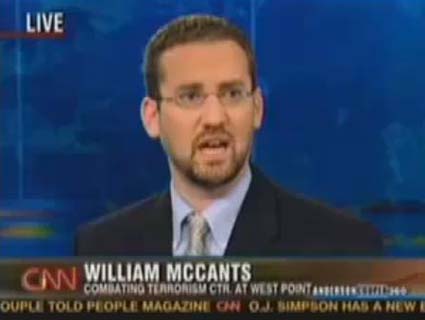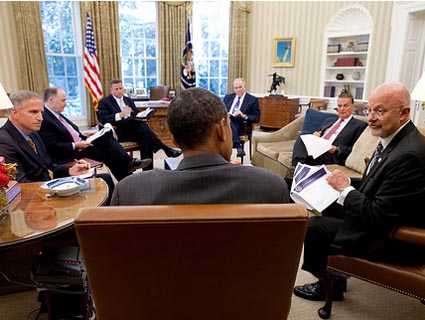
Will McCants on CNN.
The White House recently ordered a review of anti-Muslim materials being used as counterterrorism training in government agencies. The materials, which were first revealed in a series of reports by Wired‘s Spencer Ackerman, portrayed mainstream Muslims as being supportive of terrorists, and Islam itself as inherently violent.
The American Civil Liberties Union has been one of the organizations challenging the presence of anti-Muslim materials in counterterrorism training, but this morning a blog post by the ACLU’s Josh Bell cited as an example of Islamophobia an essay in a textbook published by the Counterterrorism Center at West Point that isn’t actually Islamophobic:
The ACLU, through Freedom of Information Act lawsuits, has uncovered numerous FBI counterterrorism training materials that falsely portray American Muslim and Arab communities as monolithic, violent and supporters of terrorism. A prime example is a 2008 counterterrorism textbook called Terrorism & Political Islam: Origins, Ideologies, and Methods, which was produced by the FBI and the Combating Terrorism Center at West Point. It contains essays with conclusions like “the Jihadis are a product of and inspired by the current of traditional Islam.”
The quote cited by Bell is wrenched from its original context. The essay states that “One extreme is the notion that the movement has nothing to do with Islam; it is an aberration…clearly the Jihadis are a product of and inspired by the current of traditional Islam described above.” The “above” refers to an entire article on Islamic political movements that used violence. The paragraph goes on to add that “The other extreme is to mistake this current for the entire ocean. Jihadis would have us think so, as would some Western alarmists. Such tendentious readings of Islamic history and scripture are not only lazy; they give greater legitimacy to the ideology that is fueling the Jihadi Movement.” That can’t possibly be read as portraying Muslims and Arabs as “monolithic, violent, and supporters of terrorism.”
“The last paragraph or two, I was trying to split the difference between the ridiculous notion that jihadism is somehow representative of mainstream Islam, but I was also pushing back against the idea that it has no connection to the scripture or the history,” said Will McCants, the former State Department counterterterrorism adviser who wrote the essay in question. “The tradition I was describing was the most hardline, the most militant strain of Islam.”
ACLU National Security Policy Counsel Mike German, himself a former FBI Agent, stood by the post but said that “we’re looking at the way we wrote it, and if we think something needs to be massaged or added to, we’re open to do with that.” He added that “we were just trying to summarize a concern in materials that were otherwise professionally done that there were still elements that had problems.”
German is correct there. Although the textbook’s preface describes Muslim communities as America’s “greatest allies” against terrorism, as Ackerman noted in a previous piece, one of the essays in the collection implies that a Muslim expressing opposition to the war in Iraq might “indicate the individual follows militant ideology.” At the time the textbook was published, more than half of all Americans opposed the Iraq war. Most, presumably, were not militant Islamists.
“There is other material in there that is questionable,” McCants said. “It is very healthy for watchdog groups like the ACLU to make sure that the material being taught about the beliefs of citizens in this country is accurate and fair, but I think they undermine their credibliity to do that when they are not being accurate and fair.”















